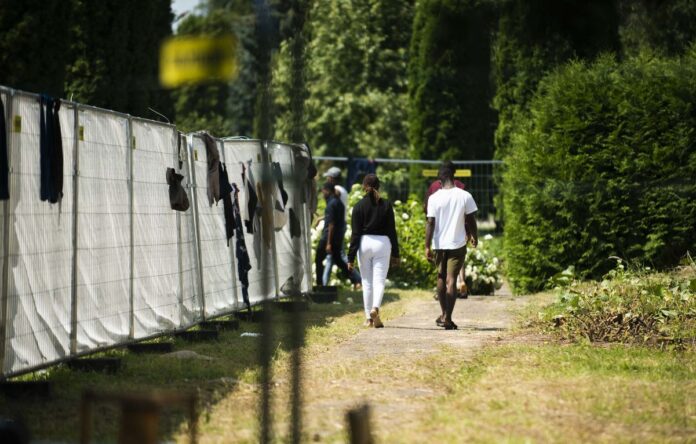
On July 13, the Lithuanian parliament passed amendments allowing the detention of migrants for up to six months and limitation of their rights. The adopted amendments to the Law on the Legal Status of Aliens, initiated by the Interior Ministry, came in response to the ongoing influx in migration, and were backed by 84 lawmakers, with one voting against and five abstaining. The changes will come into force once they are signed by President Gitanas Nausėda.
Presenting the amendments, Interior Minister Agnė Bilotaitė said that the country’s special services indicate that migration flows might increase further, which calls for “swift, deterring, and united” measures. A total of 1,716 migrants have been detained at Lithuania’s border with Belarus this year so far, an increase from 81 people detained in the whole year of 2020, 46 in 2019, and 104 in 2018.
Most of the migrants originally come from the Middle East and Africa, with Lithuanian officials saying the regime of Alexander Lukashenko is complicit in facilitating the transfers. In retaliation for sanctions, Minsk says it is no longer stopping migrants seeking to cross into the European Union.
A former Constitutional Court judge said the legislation brazenly violates Lithuania’s constitution, while political leaders defend the measures as expedient. The legislation also limits the right of appeal for rejected asylum-seekers. Migrants will not be allowed to challenge unfavourable rulings of lower courts at higher-instance courts. Moreover, they can be deported while their appeals are under consideration. Former Constitutional Court chairman Dainius Žalimas has called the measures “legislative nihilism”. “It would be hard to find a more blatant violation of the constitution done on purpose rather than out of ignorance,” he insisted, adding that the legislation would be scrapped, if it were challenged at the Constitutional Court.
Several non-governmental organizations have said the decision to detain migrants violates Lithuania’s international obligations, as well as the rights of the asylum seekers. “The law is a potential human rights violation, and it does not correspond to EU directives,” Eglė Samuchovaitė of the Lithuanian Red Cross told the news agency Reuters. “It enshrines the current bad situation in Lithuania’s detention centers in law and leaves vulnerable people in an even more vulnerable situation.” The Lithuanian Red Cross, which is organizing volunteers to work with the detained migrants, has said that some 40% of them belong to vulnerable groups, such as mothers with children, unaccompanied minors, or victims of violence.
Viktorija Čmilytė-Nielsen, the liberal speaker of the parliament, said that some criticisms of the legislation might be justified, but defended it nonetheless. “Lithuania is facing an unprecedented threat when migrants are used as a tool to put pressure on both Lithuania and the European Union,” she told reporters before the vote. “Today, we stated in the parliament that this influx of migrants is not a natural wave of migration, it is an element in a hybrid attack by the Belarusian regime,” Čmilytė-Nielsen told LRT TV. “And we adopted decisions that simplify and speed up the processing of asylum applications, and also allow to restrict certain rights when an extreme situation is declared in the country.” The Lithuanian government declared a state-level emergency last week, saying it would help to deal with the influx of irregular migrants more efficiently.
Prime Minister Ingrida Šimonytė has said that Lithuanian institutions are still capable of dealing with the migrants, but may be overwhelmed if the flows intensify. She conceded that, in such an event, Lithuania might not be able to fully ensure the migrants’ rights. “The government is surely intent on ensuring the rights of people who have illegally crossed the Lithuanian border, taking into account special assistance that might be needed by vulnerable groups, children or pregnant women. The government is not interested in violating anyone’s rights, but we need to look at the situation soberly and it can happen – which is not the case at the moment – that we will not be able physically to ensure all the rights to everyone,” Šimonytė told reporters. She said the new legislation defines a “basic” level of rights that should be maintained, while “we will try to make sure that people’s dignity is respected, even if they turned up in the Republic Lithuania uninvited”.
President Gitanas Nausėda commented that the legal situations of asylum seekers should be resolved in a way “that we would at least not promote a new influx of migrants”.
News from LRT.lt





























